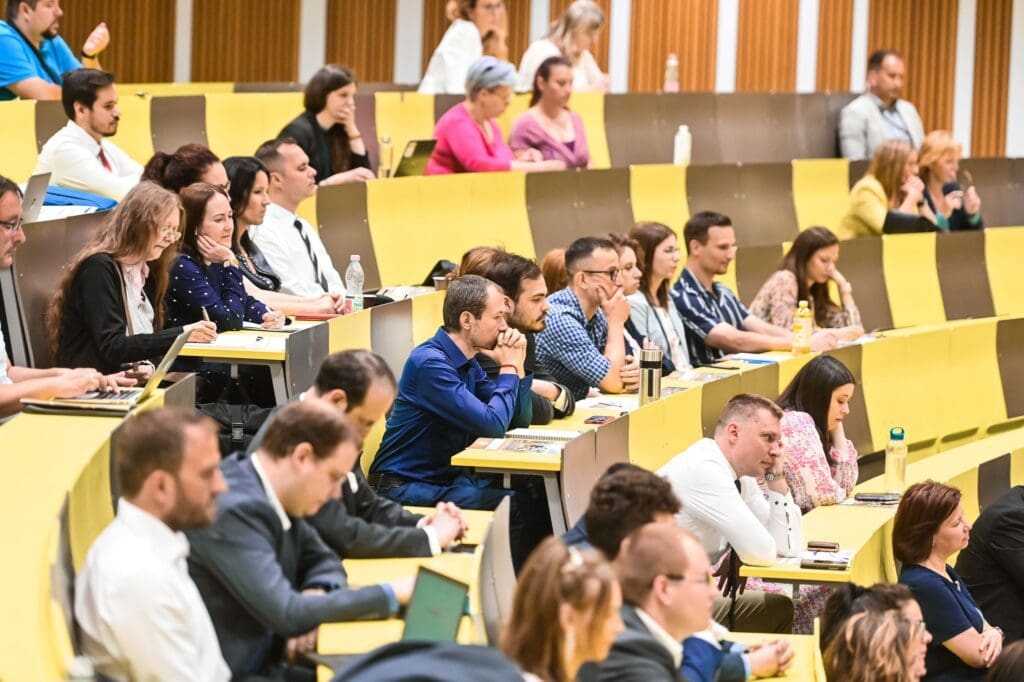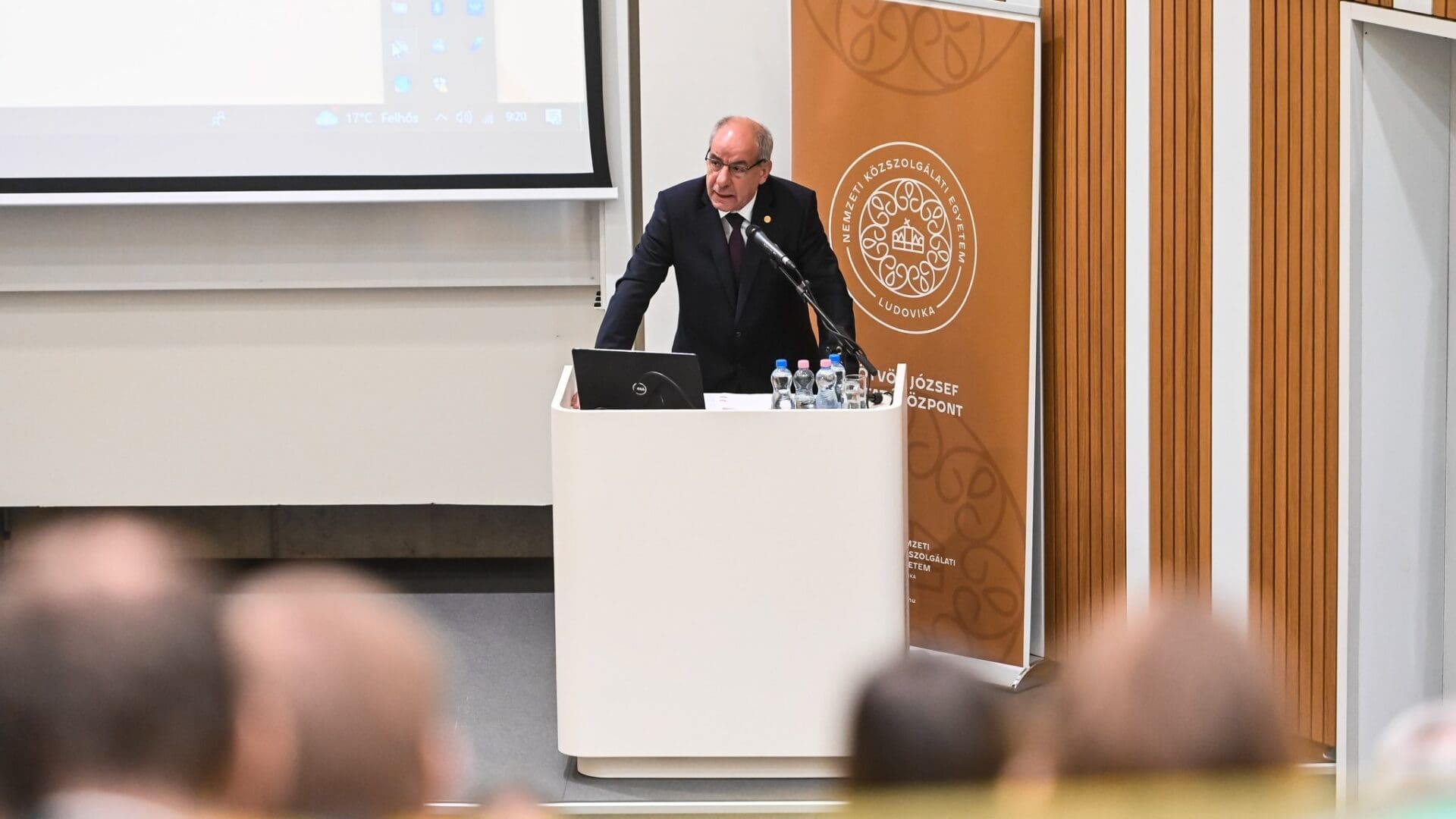A conference titled Humans in the Midst of the Latest Technologies was jointly organised by the Constitutional Court (AB), the National Authority for Data Protection and Freedom of Information (NAIH), and the Institute for Information Society Research (ITKI) of the University of Public Service (NKE) on 31 May at the NKE Education Centre.
Knowing One’s Self
The conference, which has become a tradition and took place for the fourth time, was opened by Bernát Török, the director of ITKI and the director of the Eötvös József Research Centre. He proudly announced that this year there were more submissions for presentations than ever before, allowing this scientific gathering to examine the relationship between humans and technology from a broader perspective. He pointed out that the most important question is where humans stand among technological advancements and what we must preserve as essential to our humanity. In this context, Bernát Török quoted Pope Francis, who, during his visit to Hungary with representatives of science, referred to the inscription at the Oracle of Delphi: ‘Know Yourself!’ To ensure that life can continue and to find the place of machines within it, understanding ourselves as human beings is crucial.
Morality Should Be In Focus
Constitutional Court President Tamás Sulyok gave a fascinating presentation titled ‘Will the digitalised world bring about loss of face or hardening in constitutional adjudication, or can the expansion of artificial intelligence undermine fundamental rights protection?’ The President requested a greeting from the text-generating artificial intelligence (AI), ChatGPT. As a topic, he provided the scenario of what would happen if the expansion of AI took away the work of lawyers. The robot highlighted in a direct style that emotions and humour are areas where machines still struggle. Shifting the tone to a more serious note, Tamás Sulyok quoted the three laws created by Isaac Asimov regarding robots. The first of the famous Laws of Robotics states that a robot must not harm a human being or, through inaction, allow a human being to come to harm. Secondly, the robot must obey orders, except when it conflicts with the first law. And finally, the robot must protect its own existence as long as it does not violate the previous laws. Asimov, therefore, emphasised human life and human dignity in relation to robotics, with the latter being a strong constitutional fundamental right. The President of the Constitutional Court argued that robots should not be seen as competitors but as partners.
Digital solutions are tools that can be used correctly or incorrectly, responsibly or irresponsibly, he stressed.
Tamás Sulyok also mentioned that laws are suitable for regulating already established life situations. However, the pace of technological development is such that it is not possible to understand and regulate it in real-time. Nevertheless, it would be a loss of face if legal practitioners turned a blind eye while AI enters areas where serious fundamental rights questions arise. One such area is autonomous driving. The danger lies in robots appearing in life alongside humans as autonomous entities with their own characteristics. It is worth noting, he added, that the basis for AI’s decision-making is logic, while human decisions are fundamentally influenced by morality.
Justice Sulyok concluded that it is necessary, not in the future but right now, to attempt to create a legal framework that is flexible enough to be applied in an ever-changing world. Lawyers need to toughen up: they need to step out of their comfort zone and, even though it may not be their field of expertise, understand technology, especially its impact on society.
GDPR And AI
The plenary lecture of Attila Péterfalvi, the President of the National Authority for Data Protection and Freedom of Information (NAIH), was titled ‘Artificial Intelligence and Data Protection: Regulatory Experiences.’ He presented two cases where the use of AI violated the General Data Protection Regulation (GDPR). In the first case, a bank analysed conversations received by its customer service and drew conclusions from them using AI.
The robot created a list of callers in order of dissatisfaction.
This data was not only treated as business data but also factored into the performance evaluation of the operators. The affected individuals did not receive adequate information about this data collection, which meant that the the data controller did not respect the right of the data subject to object to the data collection. Thus the so-called balancing of interests was merely documented on paper, but did not actually take place.

The other case presented by Attila Péterfalvi was a data protection incident involving the ChatGPT application in Italy. The incident occurred due to a technological change in the software’s cache, which the data controller did not report to the Italian data protection authority. As an interim measure, the authority immediately banned the operation of the service. The owner of the software contacted the Italian office to find out the conditions under which the service could resume. The authority required the provision of appropriate data protection information and also requested the proper assurance of the right to object, rectify, and erase data. Further conditions for the operation of ChatGPT in Italy include developing the application by 30 September in a way that excludes children under 13 from the service, and allows the use of the service for those aged 13–18 only with parental consent. It is also mandatory for the company, OpenAI, to launch an information campaign in the Italian mass media with content agreed upon with the authority.
Asking Good Questions
Árpád Rab, a trend researcher and senior scientist at ITKI, shared his thoughts with the audience under the title ‘The Future of the Individual in the Information Society.’ He emphasised that it is not technology that changes the world, but rather humans. After all,
we create various technologies because we want to solve the problems that lie ahead of us.
Humans cannot be efficient enough, but a machine can be. Until now, we have been creating machines wastefully in consumer society, and that needs to change, Rab stressed.
Árpád Rab also talked about how future research is based on the problems people will face in the coming years. The more we pay attention to societal problems, the easier it is to provide good solutions. It is up to humans to envision the future that will occur ten years from now. In this regard, it is important to ask the right questions about technology. He provided an example: asking whether AI will take away our jobs is not a good question.
What truly concerns people is whether it will take away their income as well.
Because if we could earn the same amount of money with less soul-crushing and monotonous work and with more creative work, that would hardly bother us.
Throughout the day, a total of fifteen parallel session meetings and nearly sixty presentations were held, where invited domestic experts discussed various aspects of the relationship between the human person and the latest technologies.








